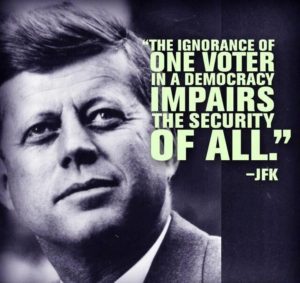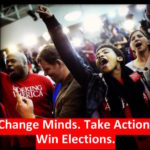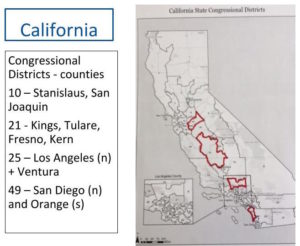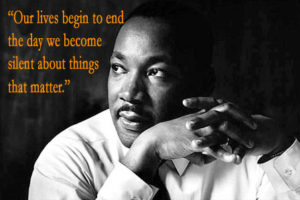
Follow Up Action to:
Follow Up Action to May 15 Town Hall: Working America
VOLUNTEER OR WORK WITH WORKING AMERICA IN CALIFORNIA SWING DISTRICTS 10 AND 21!
What is Working America
Working America is a community affiliate of the AFL-CIO and is a non-partisan organization 501(c)(5) [union and PAC]. They do not engage in primaries, but pivot from issue canvassing to candidate persuasion after primaries. Working America:
- Engages in year-round canvassing, going door-to-door not just in election years.
- Has run only paid-canvasser programs, but will pilot volunteer programs in California
- Hires paid canvassers locally and also work with volunteers (this is where Bay Area volunteers are needed)
Working America is also considering launching a naturalization program, which could make citizenship training available in places where interested people would otherwise find it difficult or impossible to get to such classes.
Analysis of the results of the 2016 elections helped lead Working America to take on the challenge of flipping Congressional seats in 2018, with the initial focus on Congressional Districts 10 and 21. As a non-partisan group, their intent is to oust Representatives whose voting record doesn’t support the interests of working Americans.
Working America operates on three philosophies when canvassing:
- LEAD LOCALLY
- WA enlists and trains community action teams. Any volunteer who is not a local only serves to assist, not be the lead canvasser
- LISTEN
- Longer conversations result in 1/3 of people spoken to reconsidering their position
- MULTIPLE POINTS OF CONTACT
- In 2014, Working America members canvassed twice (once early in the cycle and again during the election) turned out at a rate 3.5 points higher than those canvassed only once earlier in the year.
- In North Carolina, voters who were canvassed during the 2014 and 2016 cycles turned out at a rate of 3 points higher than those canvassed only in 2016
Working America’s approach WORKS:
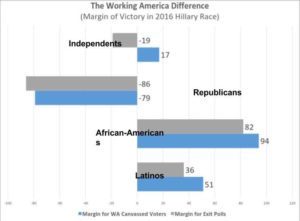
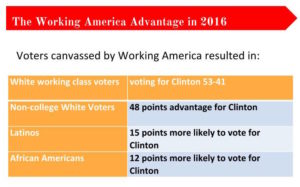 Working America: Swing Districts in California
Working America: Swing Districts in California
Working America is on the ground in the Central Valley, committed to building the resistance and building a majority for progressive change. The California districts which Working America will focus on to turn 2018:
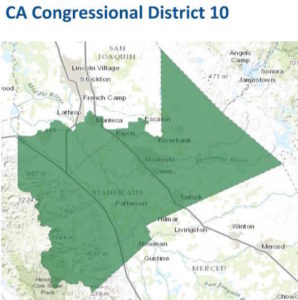 The Bay Area’s swing district, California Congressional District 10, encompasses an area of the northern San Joaquin Valley.
The Bay Area’s swing district, California Congressional District 10, encompasses an area of the northern San Joaquin Valley.
The district consists of Stanislaus County, and portions of San Joaquin County. It is centered on Modesto. Cities in the district include Oakdale, Manteca, Modesto, Tracy, and Turlock.
Jeff Denham, a Republican and former State Senator, has represented the district since January 2013. In the last election, Jeff Denham won this district by only 8,201 votes (3.4%).
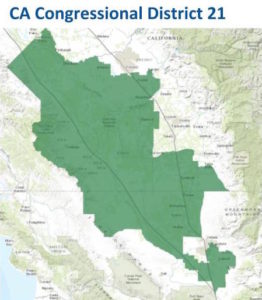
California Congressional District 21 is centered in the San Joaquin Valley, and includes areas of Fresno County, Kern County, Kings County, and Tulare County. Cities in it include: Coalinga, Delano, Hanford, and outer parts of Bakersfield.
The district is currently represented by Republican David Valadao. In the last election, David Valadao won this district by only 17,844 votes (13.5%).
The nation’s least-educated congressional district is California’s 21st Congressional District. This district covers most of the southern part of California’s San Joaquin Valley,
The 21st also tops several other “Most District” categories that are closely related: it’s the district with the highest percentage of workers employed in agriculture (28.5% of workers). It’s also the most male district, with 52.5% of the population being male, and the nation’s district with the highest percentage of families with children (46%).
The representative in the 21st, since redistricting in 2012, has been Republican David Valadao.
Help swing these states to Democrat so these counties, with some of the most needs in the country, have access to education, healthcare, good wages, homes, and a more fair justice and immigration system.
Follow Up Action to March 27 Town Hall (Electoral Integrity: CAVO, FairVote, We the People)


Brent Turner of CAVO, fighting for an open source system so the entire process is transparent, secure from any bugs (planted or otherwise), and with a clear chain of command.
Pedro Hernandez of FairVote committed to the immediate goal is to bring rank voting into specific areas and to push for voting day to be a national holiday.More than a decade ago, FairVote is also the leading institutional voice calling for the establishment of an explicit individual right to vote in the U.S. Constitution.
Eric Johnson of We the People works across the nation on phone banking, one campaign outreach tactic for candidates. How does phone banking work, what do you say, and how to get involved. There are phone banks on April 2, 2-4pm (RSVP here) and April 8, 1-5pm with multiple shifts (RSVP here for 1-3pm and here for 3-5pm).
Overview
In our March 27 Electoral Integrity Town Hall, we focused on only three pieces of this complex puzzle:
- The systems employed in tallying votes. Currently, the systems used to tally votes are corporate owned and proprietary. There is no transparency, no clear chain of command or oversight, and no security leaving these systems vulnerable to hacking. California is on the forefront of solving this to ensure votes are counted with precision and security. We invited one of the forerunners of change on this issue, the California Association of Voting Officials (CAVO). CAVO’s mission is simple: To ensure that the will of the people is being honored and that democracy is protected we must mandate the use of the most secure and transparent voting systems available.
- The way a winner is decided. The winner in most elections is the one with majority of votes, even if that majority entailed just one percent. FairVote believes that not only is this current method is not democratic where the majority may not be represented but it also limits the candidate pool, completely shuts out any other minority voices, and fosters polarization. What is ranked voting and can that be the answer in future elections? How can you bring it to your town? And how can you take just step to ensure voting is more accessible, by making election day a national holiday!
- Campaign tactic: phone banking. One way candidates garner supporters is through phone banking. Speaking to your representatives has now finally gotten attention, so being able to call a rep is also crucial for civic engagement on issues. Let We the People who work with candidates across the country explain what phone banking is, how it works, how you can participate in upcoming elections.
We the People: Phone Banking in upcoming elections
Put your phone bank training into action! Download the We the People Phone Bank Training Handout
Sunday, April 2, 2–4pm, 1117 Lord Ivelson Lane, Foster City
Bring your laptop or tablet and cell phone, and a drink or dessert to share. To RSVP or join our mailing list, e-mail [email protected] OR join us on Meetup.com at http://tinyurl.com/lzocoue
Saturday, April 8, 1–5pm, Howie’s Pizza, Redwood City, 837 Jefferson Avenue, RWC 94063 Come for one or both shifts!
Bring your laptop and cell phone, and any snacks you want to share.
RSVP for shift 1 (1–3 pm): http://tinyurl.com/n2kkszw
RSVP for shift 2 (3–5 pm): http://tinyurl.com/n62fzb4
FairVote: Make voting day a state holiday in California. Advocate on behalf of ranked choice voting for your town or city.
If you would like to get involved in reforming your city’s election system, please contact me at [email protected]. Redwood City could adopt ranked choice voting! Stay updated by signing up at fairvoteca.org. Download FairVote’s one-page PDF on What is Ranked Choice Voting?
We are also supporting AB 674, which adds a new state holiday on the first Tuesday after the first Monday in November to coincide with every statewide general election!
Here is our call:
Call your State Assemblymember!
AB 674 adds a new state holiday on the first Tuesday after the first Monday in November to coincide with every statewide general election.
Currently, the bill will go through the Elections Committee next week, followed by the Governmental Organization Committee. We are asking folks to call their state representatives from these committees over the next four weeks.
To find your state representative, visit http://findyourrep.legislature.ca.gov/
Members of the Elections Committee include Low, Harper, Cunningham, Berman, Calderon, Mullin, Weber.
Members of the Governmental Organization Committee include Gray, Bigelow, Acosta, Aguiar-Curry, Bocanegra, Bonta, Brough, Cooley, Cooper, Daly, Gallagher, Garcia, Gipson, Gloria, Jones-Sawyer, Kiley, Levine, Low, Rubio, Salas, Waldron.
When calling your representative, here are some brief talking points you may use:
- I support making Election Day a holiday because it makes voting more convenient, increases voter turnout, and creates a larger pool of poll workers and election volunteers.
- Doing so would allow people to vote at any point in the day, not just before or after work.
- This would increase access to voting and decrease voting lines during often crowded times at the start and the end of an Election Day.
- An Election Day holiday would also greatly increase the number and diversity of pollworkers that are available to help our polling places run efficiently.
- Election Day holidays would highlight elections as a fundamental part of our democracy and support a culture of voting
